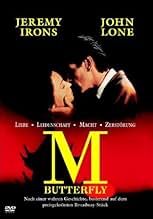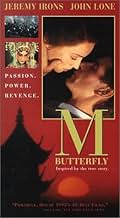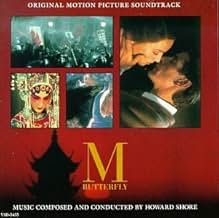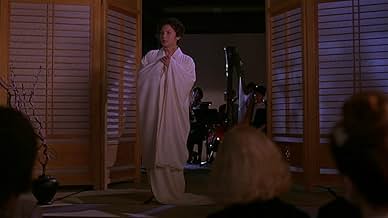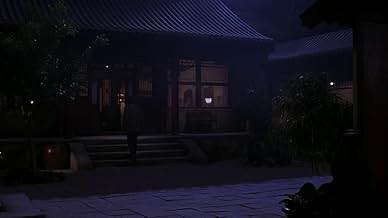In 1960s China, French diplomat Rene Gallimard falls in love with an opera singer, Song Liling - but Song is not at all who Gallimard thinks.In 1960s China, French diplomat Rene Gallimard falls in love with an opera singer, Song Liling - but Song is not at all who Gallimard thinks.In 1960s China, French diplomat Rene Gallimard falls in love with an opera singer, Song Liling - but Song is not at all who Gallimard thinks.
- Awards
- 1 win & 1 nomination
Storyline
Did you know
- TriviaDavid Cronenberg loved the play so much that when he heard a movie was being made about it, he volunteered immediately to direct it.
- GoofsThe word accordion is misspelled "accordian" in the closing credits.
- Quotes
Song Liling: The days I spent with you were the only days I ever truly existed.
Featured review
Jeremy Irons has specialised for many years in playing characters who build up a world of their own, and then have the world fall to pieces around them; who destroy themselves internally. This is the key characteristic for his parts in Damage, Cronenberg's Dead Ringers, Lolita (of course) and M. Butterfly. In this movie, however, it slightly misses the true impact of such events Irons has exhibited so well in those other parts, mainly because the final "revelation" actually doesn't happen until after Gallimard's world has already collapsed, with Butterfly's arrest (by the Red Guard, as an artist and thus a criminal) and his own recall to Paris. But he doesn't find out the truth about his Butterfly until the court case, where Irons is unable to react - he has to react without reacting, so to speak, and he just sits there looking as if he'd just bitten into a thistle. Were I to write the screenplay, I would have changed some of the order of events. It is not important to the movie that Gallimard learn of the true nature of his lover in the court room, so I would have that revelation earlier, thus completing the cycle of destruction we have seen in his life, and also avoiding that impossible ride in the police van near the end of the film. (First of all, it is impossible that two co-defendants in an espionage case would be transported together, secondly it is impossible that they be alone without a guard in the back, and thirdly it is quite impossible that the guards in the front of the van would not have noticed that one of the prisoners has taken off all his clothes!) Certain other elements also detracted from the movie. It does not do an avowedly art house film any good to Hollywood-ise things up by having Chinese people talk to Chinese people in heavily accented English.
And in the end, what was achieved? This case, as is pointed out in the film, was a national joke in France. Presumably Hwang didn't give the case the comedy treatment because he saw something deeper, something to learn about human nature. But in fact we learn very little about human nature that wasn't already obvious - the idea of subsuming one's whole being to an image of perfection; the inability to love the creator of an image if one has loved the image and discovered it to be nothing. All this is too obvious. Some merit might have been retrieved if it could be shown that Gallimard was intentionally deceiving himself, but that is clearly not the case.
An "ordinary" movie from David Cronenberg transpires to be almost too ordinary.
And in the end, what was achieved? This case, as is pointed out in the film, was a national joke in France. Presumably Hwang didn't give the case the comedy treatment because he saw something deeper, something to learn about human nature. But in fact we learn very little about human nature that wasn't already obvious - the idea of subsuming one's whole being to an image of perfection; the inability to love the creator of an image if one has loved the image and discovered it to be nothing. All this is too obvious. Some merit might have been retrieved if it could be shown that Gallimard was intentionally deceiving himself, but that is clearly not the case.
An "ordinary" movie from David Cronenberg transpires to be almost too ordinary.
- Clive-Silas
- Jun 9, 2003
- Permalink
- How long is M. Butterfly?Powered by Alexa
Details
Box office
- Gross US & Canada
- $1,498,795
- Opening weekend US & Canada
- $57,280
- Oct 3, 1993
- Gross worldwide
- $1,498,795
- Runtime1 hour 41 minutes
- Color
- Sound mix
- Aspect ratio
- 1.85 : 1
Contribute to this page
Suggest an edit or add missing content




